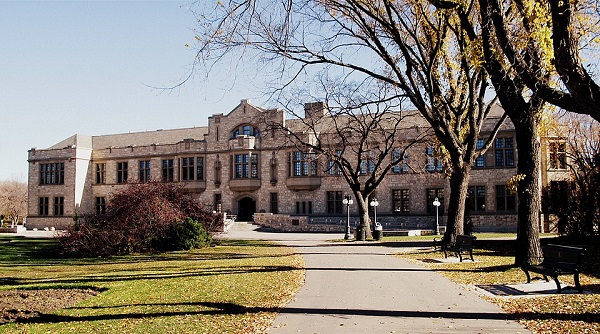DEI
TMU Medical School Sacrifices Academic Merit to Pursue Intolerance

From the Frontier Centre for Public Policy
Race- (and other-) based admissions will inevitably pave the way to race- (and other-) based medical practices, which will only further the divisions that exist in society. You can’t fight discrimination with more discrimination.
Perhaps it should be expected that a so-obviously ‘woke’ institution as the Toronto Metropolitan University (TMU) would toss aside such antiquated concepts as academic merit as it prepares to open its new medical school in the fall of 2025.
After all, until recently, TMU was more widely known as Ryerson University. But it underwent a rapid period of self-flagellation, statue-tipping and, ultimately, a name change when its namesake, Edgerton Ryerson, was linked (however indirectly) to Canada’s residential school system.
Now that it has sufficiently cleansed itself of any association with past intolerance, it is going forward with a more modern form of intolerance and institutional bias by mandating a huge 80% diversity quota for its inaugural cohort of medical students.
TMU plans to fill 75 of its 94 available seats via three pathways for “equity-deserving groups” in an effort to counter systemic bias and eliminate barriers to success for certain groups. Consequently, there are distinct admission pathways for “Indigenous, Black and Equity-Deserving” groups.
What exactly is an equity-deserving group? It’s almost any identity group you can imagine – that is, except those who identify as white, straight, cisgender, straight-A, middle- and/or upper-class males.
To further facilitate this grand plan, TMU has eliminated the need to write the traditional MCAT exam (often used to assess aptitude, but apparently TMU views it as a barrier to accessing medical education). Further, it has set the minimum grade point average at a rather average 3.3 and, “in order to attract a diverse range of applicants,” it is accepting students with a four-year undergrad degree from any field.
It’s difficult to imagine how such a heterogenous group can begin learning medicine at the same level. Someone with an advanced degree in physiology or anatomy will be light years ahead of a classmate who gained a degree by dissecting Dostoyevsky.
Finally, it should be noted that in “exceptional circumstances” any of these requirements can be reconsidered for, you guessed it, black, indigenous or other equity-deserving groups.
As for the curriculum itself, it promises to be “rooted in community-driven care and cultural respect and safety, with ECA, decolonization and reconciliation woven throughout” which will “help students become a new kind of physician.”
Whether or not this “new kind of physician” will be perceived as fully credible, however, is yet to be seen. Because of its ‘woke’ application process, all TMU medical graduates will be judged differently no matter how skilled they may be and even when physicians are in short supply. Life and death decisions are literally in their hands, and in such cases, one would think that medical expertise is far more important than sharing the same pronouns.
Frankly, if students need a falsely inclusive environment where all minds think alike to feel safe and a part of society, then maybe they aren’t cut out to become doctors who will treat all people equally. After all, race- (and other-) based admissions will inevitably pave the way to race- (and other-) based medical practices, which will only further the divisions that exist in society. You can’t fight discrimination with more discrimination.
It’s ridiculous to use medical school enrollments as a means of resolving issues of social injustice. However, from a broader perspective, this social experiment echoes what is already happening in universities across Canada. The academic merit of individuals is increasingly being pushed aside to fulfill quotas based on gender or even race.
One year ago, the University of Victoria made headlines when it posted a position for an assistant professor in the music department. The catch is that the selection process was limited to black people. Education professor Dr. Patrick Keeney points out that diversity, equity and inclusion policies are reshaping core operations at universities. Grants and prestigious research chair positions are increasingly available only to visible minorities or other identity groups.
Non-academic considerations are given priority, and funding is contingent on meeting minority quotas.
Consequently, Keeney states that the quality of education is falling and universities that were once committed to academic excellence are now perceived as institutions to pursue social justice.
Diversity is a legitimate goal, but it cannot – and should not — be achieved by subjugating academic merit to social experimentation.
Susan Martinuk is a Senior Fellow with the Frontier Centre for Public Policy and author of Patients at Risk: Exposing Canada’s Health-care Crisis.
Aristotle Foundation
The University of Saskatchewan is on an ideological mission

By Peter MacKinnon
The program is part of an ideological crusade within our universities, one that includes identity-based admissions and faculty appointments, and discourages those who differ from speaking out or taking issue with its direction.
It needs to end
I must disclose my background here; I was employed by the University of Saskatchewan for 40 years including 13 years as president. The institution’s distinctive origins combined the development of liberal education with a responsibility to build the province’s agricultural industry, and it did the latter with world-class agricultural programs and research institutes, and with faculty and students of many backgrounds from around the globe.
Now, we are told, the academic personnel in this worldly environment require mandatory training on racism: an Anti-Racism/Anti-Oppression and Unconscious Bias Faculty Development Program. It is compulsory; those who decline its offerings will be shut out of collegial processes previously thought to be their right as tenured faculty.
It was earlier reported that the program emerged from collective bargaining at the initiative of the university’s faculty union; if so, this does not relieve the administration from responsibility; it signed the collective agreement.
“Program” is a euphemism. It is a propaganda module in which scholarly expertise and balance will not be found. It does not appear that the instructor has a university academic post and the program’s ideological hue is revealed in the two required readings, one by Idle No More co-founder Sheelah McLean whose theme is that the success of Saskatchewan’s white people is built on “150 years of racist, sexist and homophobic colonial practices.”
The second is by five “racialized” faculty who claim that Canadian university systems are rigged to privilege white people. Dissent, contrary views or even nuance are neither expected nor tolerated here. Opinions that are different are not on the reading list.
One participant, a law professor, was invited to leave after 30 minutes because he did not lend his voice to its purpose and orientation; he revealed that he was present because it was required. The purpose of the program is indoctrination and there is no room for dissent.
The program is part of an ideological crusade within our universities, one that includes identity-based admissions and faculty appointments, and discourages those who differ from speaking out or taking issue with its direction.
It is not present to the same degree in all of these institutions, but it is visible in most and prominent in many. It disparages merit, distorts our history and rests on the proposition that a white majority population has perpetrated a wide and pervasive racist agenda against others. It takes its conclusions as self-evident and not requiring evidence. It is authoritarian and intolerant, and should have no place in institutions committed to excellence and the search for truth.
The question, of course, is what is to be done. There is a view that “this too shall pass;” it is a fad that will recede in time.
But we must note, these are public institutions supported by tax dollars, and by the contributions of time and money by alumni and supporters. We should not tolerate their politicization and sidetracking of the academic mission in favour of the ideology on display here. The pushback should begin with governments and extend to others who care about these vital institutions.
But first the ideology must be recognized. There is no public uproar and little clamour from within the institutions; dissenting professors and students fear that negative professional and personal repercussions may follow. University-governing bodies stand down or away, not wanting to be involved in controversy. Resistance must come from outside the institutions: governments must insist that the propaganda must end, and they should be joined by alumni, supporters and the general public. The credibility of our universities depends on their willingness to say no.
Peter MacKinnon has served as president of three Canadian universities and is a senior fellow at the Aristotle Foundation for Public Policy. Photo: WikiCommons
2025 Federal Election
Carney Liberals pledge to follow ‘gender-based goals analysis’ in all government policy

From LifeSiteNews
‘We will continue to update the GBA+ tool to ensure it reflects the identities and values of all Canadians, including diversity as a core value.’
Prime Minister Mark Carney’s Liberal Party is promising to effectively mandate that all government policies and initiatives be measured using “Gender Based Analyses” before being approved and implemented.
The Liberal’s “Canada Strong” election platform, under the Gender Based Analyses (GBA) tab, pledges to “ensure that every measure in this platform will be implemented with a full GBA+ analysis – so that we can continue to build Canada strong, for all Canadians.”
“A Mark Carney-led government will support and champion all Canadians, including by reviewing policies and programs using an intersectional lens. We will continue to update the GBA+ tool to ensure it reflects the identities and values of all Canadians, including diversity as a core value.”
The GBA tab also mentions “2SLGBTQI+ people” four times, three of which are related to funding promises.
It notes that a Carney-led government would protect “the values” the Charter of Rights and Freedoms was “founded on – which are under threat – and ensuring the protection of women, people with disabilities, racialized and Indigenous communities, and 2SLGBTQI+ people.”
Carney already stated his government would provide sterilizing puberty blockers to children “without exception,” calling harmful “transitioning” surgeries and chemical “treatments” a “fundamental right.”
While campaigning to become Liberal Party leader, Carney had also promised that his government would pursue an agenda of “inclusiveness” to counter U.S. President Donald Trump’s more socially conservative agenda.
His promise to promote “inclusiveness” in Canada in opposition to Trump’s agenda came only days after former Prime Minister Justin Trudeau’s Liberal government promised an extra $41.5 million in taxpayer funds to advance 106 pro-LGBT projects “across Canada.”
Carney, whose ties to globalist groups have had Conservative Party leader Pierre Poilievre call him the World Economic Forum’s “golden boy”.
Canadians will head to the polls on April 28.
-

 Crime2 days ago
Crime2 days ago“This is a total fucking disaster”
-

 Fraser Institute1 day ago
Fraser Institute1 day agoBefore Trudeau average annual immigration was 617,800. Under Trudeau number skyrocketted to 1.4 million annually
-

 International2 days ago
International2 days agoChicago suburb purchases childhood home of Pope Leo XIV
-

 MAiD2 days ago
MAiD2 days agoCanada’s euthanasia regime is already killing the disabled. It’s about to get worse
-

 Daily Caller2 days ago
Daily Caller2 days ago‘I Know How These People Operate’: Fmr CIA Officer Calls BS On FBI’s New Epstein Intel
-

 Daily Caller2 days ago
Daily Caller2 days agoBlackouts Coming If America Continues With Biden-Era Green Frenzy, Trump Admin Warns
-

 Red Deer2 days ago
Red Deer2 days agoJoin SPARC in spreading kindness by July 14th
-

 Business1 day ago
Business1 day agoPrime minister can make good on campaign promise by reforming Canada Health Act






